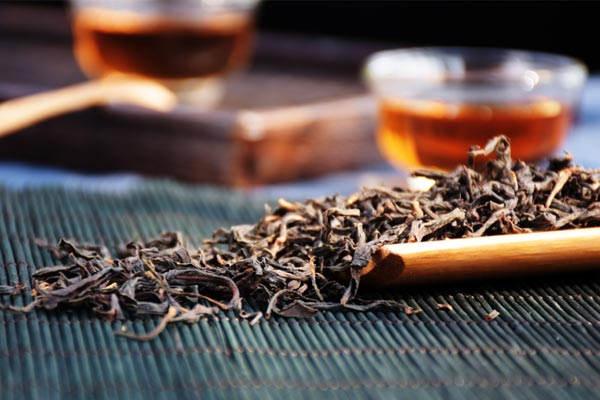What is TeaWine?
TeaWine, made from tea leaves, grain, and water, is an innovative alcoholic beverage that blends the richness of traditional baijiu with the delicate fragrance of tea leaves. It combines the mellowness of baijiu with the delicate aroma of tea leaves.
Traditional baijiu is said to become more fragrant with age, but can TeaWine be stored for a long time? Will its tea aroma diminish over time? Will the taste improve or deteriorate?
Recently, a research team from Southwest University in China published a research paper titled "Elucidation of Flavor Profile Dynamics in Tea-Flavor Baijiu During Long-Term Storage Using Sensory Evaluation Electronic Nose, HS-GC-IMS, and HS-SPME-GC-MS" in the journal Processes, which clearly explains the changes that occur during wine storage.
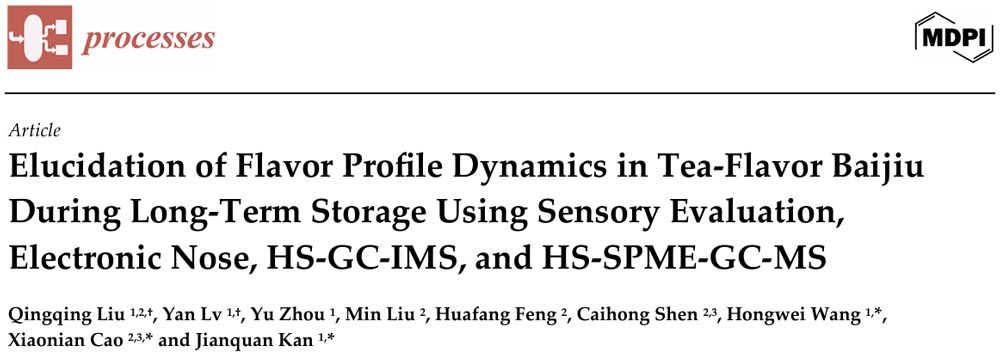
◆ Research Results
01. TeaWine Does Not Always Get More Fragrance with Age
The TeaWine samples had an alcohol content of 40.8%. They were produced by the same manufacturer in Luzhou, Sichuan, China, and stored in the same warehouse, protected from light, for storage periods ranging from one to eight years.
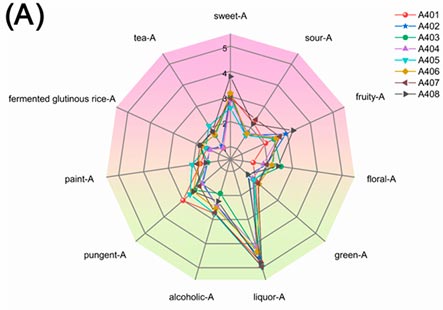
Aromatic Changes in TeaWine from One to Eight Years
Thirteen experienced tasters evaluated the aroma of TeaWine, finding that the longer it is aged, the more significant the change. However, rather than becoming more fragrant with age, the core "tea aroma" gradually loses its essence.
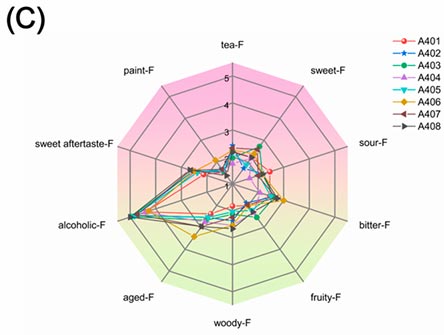
Taste Changes in TeaWine from One to Eight Years
Specifically, the tea aroma is particularly pronounced in the short-aged tea wines (A406-A408) aged 1-3 years, with a refreshing tea flavor.
However, in the long-aged tea wines (A401-A402) aged 7-8 years, the tea aroma has almost disappeared, and the inherent wine and fruit aromas of the baijiu (white spirit) become more prominent.
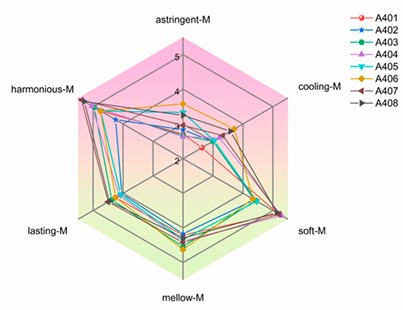
The Taste Changes of TeaWine Stored Between 1 and 8 Years
In terms of flavor, younger wines exhibit a distinct bitterness and woody notes, resulting in a mellower, more balanced mouthfeel, and a longer-lasting aroma.
Older wines, on the other hand, have a much less bitter taste and a more aged flavor, making them less stimulating, with a reduced intensity and a lack of depth.
This is beneficial for those who prefer bitterness, but those who enjoy TeaWine's "bitter after sweet" aftertaste may find the flavor bland.
02. Less Tea Aroma, More Wine Aroma
Through instrumental analysis, researchers uncovered the underlying sensory changes: the volatile compounds in the wine are quietly "transforming."
The study found that the primary aroma compounds in TeaWine are esters (such as ethyl hexanoate and ethyl acetate), which contribute to fruity and sweet aromas. With increasing storage time, the ester content increases, reaching approximately 74% in young wines and 89% in older wines.
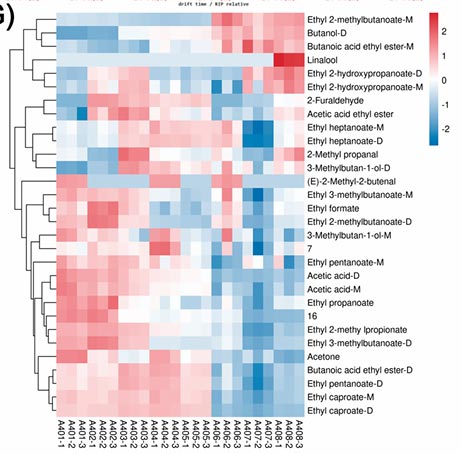
Changes in Aroma Compounds in Tea Wine with Storage Time
On the other hand, alcohols (such as propanol and butanol) can impart a pungent "alcoholic" aroma. With age, these alcohols are gradually oxidized into acids, which then react with the remaining alcohol to form esters.
Thus, with fewer alcohols, the wine's harshness is less pronounced, which is why older wines often taste "softer."
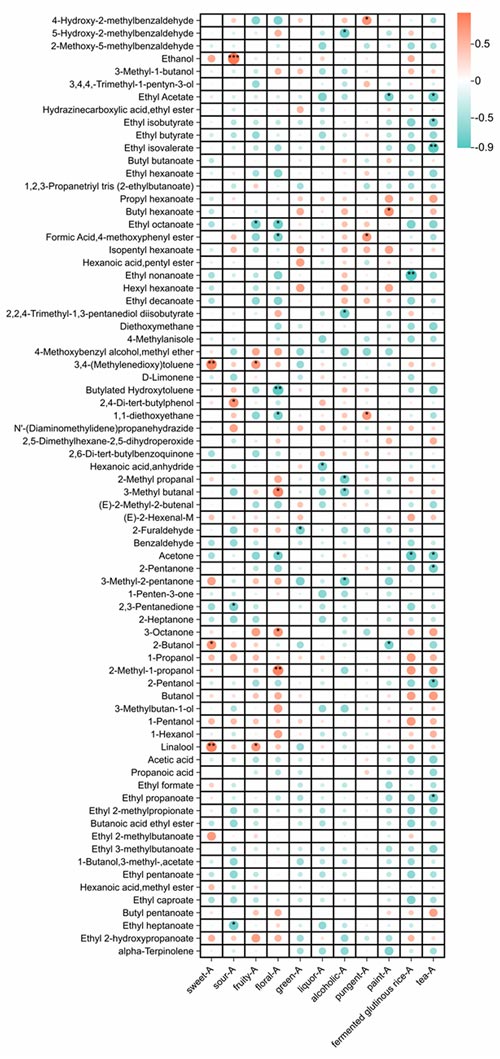
The Impact of Aroma Compounds in Tea Wine on its Aroma
03. How Long is the Ideal Storage Time for Tea Wine?
The study provides a clear answer: Tea Wine can be stored for extended periods, but excessive storage is not recommended.
- 1-3 years: The tea aroma is most prominent, and the taste is full-bodied, allowing you to experience the true character of TeaWine.
- 4-6 years: The tea aroma remains, but the bitterness becomes less intense, and the ester and tea notes are balanced, making the drink smoother.
- 7-8 years: The tea aroma is almost gone. While the wine is softer, it has lost its core characteristics, becoming not much different from ordinary strong-flavored baijiu, leaving it feeling a bit "lonely."
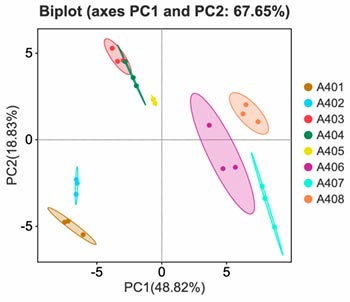
The similarity of aromas in TeaWine of different ages
In addition, the study also reminds us to store TeaWine away from light and at a constant temperature. Sunlight and temperature fluctuations accelerate the formation of esters and the loss of tea aroma. Even before the 7th year, the tea aroma may disappear prematurely.
◆ Conclusion
TeaWine is different from ordinary baijiu. Its soul is tea aroma, and tea aroma cannot withstand the test of long-term storage. While aging makes the wine mellower and less bitter, it loses its tea aroma, and its most distinctive flavor.
So, if you have TeaWine, don't expect it to age better; drink it as soon as possible to savor both the tea aroma and the wine's richness.

%20--%3e%3c!DOCTYPE%20svg%20PUBLIC%20'-//W3C//DTD%20SVG%201.1//EN'%20'http://www.w3.org/Graphics/SVG/1.1/DTD/svg11.dtd'%3e%3csvg%20version='1.1'%20id='图层_1'%20xmlns='http://www.w3.org/2000/svg'%20xmlns:xlink='http://www.w3.org/1999/xlink'%20x='0px'%20y='0px'%20width='256px'%20height='256px'%20viewBox='0%200%20256%20256'%20enable-background='new%200%200%20256%20256'%20xml:space='preserve'%3e%3cpath%20fill='%23FFFFFF'%20d='M194.597,24.009h35.292l-77.094,88.082l90.697,119.881h-71.021l-55.607-72.668L53.229,232.01H17.92%20l82.469-94.227L13.349,24.009h72.813l50.286,66.45l58.148-66.469V24.009z%20M182.217,210.889h19.566L75.538,44.014H54.583%20L182.217,210.889z'/%3e%3c/svg%3e)



